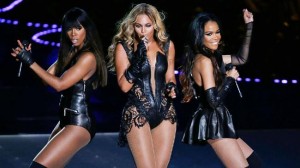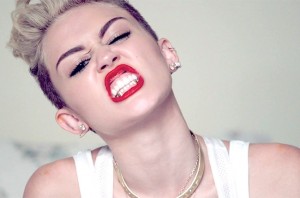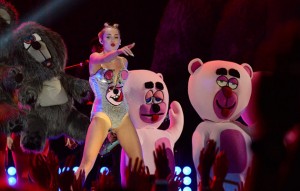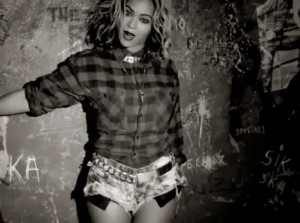Is pop music good for feminism?
When you read the title of my blog post, did you laugh? I would have, too. I mean, “pop music” and “feminism” are two thoughts you wouldn’t normally consider in the same sentence. Generally, pop music perpetuates stereotypes, either about the domesticity of or the sexual exploitation of women. But at the end of 2013, feminism seemed to be all of the rage in pop music. Pop singers were vocalizing their beliefs about feminism through the radio signals. But are these pop singers actually representing the feminist movement? Or are they hurting it?
Let’s reflect on the year of Miley Cyrus. She says,”I feel like I’m one of the biggest feminists in the world because I tell women to not be scared of anything.” That’s pretty empowering, Miley. But she doesn’t want to be anyone’s role model anymore. Now that she’s separated herself from her childhood Hannah Montana persona, she says, “Now I can be the bad bitch that I really am.”
Her single “We Can’t Stop” opens like this: “Red cups and sweaty bodies everywhere, hands in the air like we don’t care, ’cause we came to have so much fun now, bet somebody here might get some now.” Then, in her racy VMA performance, she used all white female back up dancers during her performance EXCEPT the black woman who walked out onstage to “twerk” for five seconds while Miley slapped her ass.
The tracks on her new album promote extreme partying and “having a good time.” She may have some feminist beliefs, but her lyrics aren’t “for” women and equality. Miley may be the twerk queen, but now every woman is expected to know how to twerk, let alone twerk for every guy that asks her to. Her mission and the feminist agenda do not mesh. She may harbor some feminist beliefs, but she’s not being a feminist. She’s just being famous.
Just a few weeks ago Beyonce shook up the music industry when she, without any forewarning, dropped a new 17 track album complete with a music video for each song. Beyonce’s reputation has always been what Miley claims to strive for. Beyonce has always been a clear advocate for female empowerment. The theme resonates in her hit songs, “Run the World (Girls)” and “Single Ladies” as well as her electrifying Superbowl performance last February alongside Kelly Rowland, Michelle Williams and an army of female backup dancers.
But when she released the single, “Bow Down Bitches” last March, fans were skeptical of the gritty song’s deeper message. Artists like Keyshia Cole criticized the convoluted message Beyonce was trying to portray. On her new track “Flawless,” you can hear the refutation of “Bow Down Bitches” as her aggression pierces your ears. After “Bow Down Bitches” plays, Beyonce uses a sample of a TED Talk given by Nigerian author Chimamanda Ngozi Adichie, in which she draws attention to the perpetual guilt a girl is taught to feel as she grows into a woman. Following this powerful interlude, Beyonce shifts into “Flawless” where she (again) sings about self-image, self-respect and empowerment. When she sings, “I woke up like this, I woke up like this,” what she means is that she doesn’t need beauty products to feel more like a woman.
Many other tracks on her album follow this same ideology as “Flawless”, until you get to “Partition” where Beyonce sings, “I do this all for you, baby, just take aim, and tell me how it’s looking, babe” and in the hook she sings, “Take all of me, I just wanna be the girl you like.” This doesn’t quite add up with the same message she projects in the other tracks on her album.
But the dazzle of pop music has always revolved around the over-sexualized lyrics that reinstate the notion that a woman needs a man. That’s exactly what most pop anthems are- a woman pleading for a man to call them, or a man denoting a woman’s worth to the perfection of her body. Male pop artists write lyrics that denote a woman’s worth to her curves and how he wants to own them, at least for a night.
And the worst part is that women like Miley and Beyonce let this happen when they parade onstage shiny one-piece body suits. I know they feel confident enough to wear practically nothing, and I mean all the power to them! But they are not representing the “real” woman. The real woman doesn’t wear Victoria’s Secret lingerie to her college classes, when she’s running a business meeting, or even when she’s grabbing coffee from Starbucks. They aren’t representing us, they’re representing the music industry. The music industry thrives off of this, and clearly, feminism sells. I mean, in just three days, 617,000 copies of Beyonce’s new album sold.
Claiming feminism and then perpetuating the same stereotypes that ultimately harm women is not feminism. But it’s not just pop stars that are getting this message confused. The feminist movement is constantly evolving to encompass everyone that feels oppressed. So there really isn’t a “true” definition of feminism that applies in 2014. In fact, over the years, “feminism” has become more of an umbrella term geared towards the inclusion of minorities, members of the LGBTQ community and men. In her TED talk, Chimamanda Adichie claims that a feminist is, “a person who believes in the social, political economic equality of the sexes,” Funny, the definition I conjured up was almost exactly the same.

But lets not forget the generation gap between the twenty-something feminists, the “middle aged” feminists and the feminists with all that seniority. My generation has a different view on the presentation of femininity and sexuality than my mother’s generation, or my grandmother’s, for that matter. My generation’s feminism is about maintaining balance and composure in the office, at home and in the rest of our lives. My generation’s feminism has the same mentality that Miley’s version of feminism does- we’re not scared of anything. We’ll wear what we want, say what we want, and if we think you’ve said anything misogynist, you know we’re going to call you out. We don’t want to feel obligated to wear the outfit that closely resembles a Victoria’s Secret lingerie set, but we don’t want to be called “sluts” if we decide to feel empowered by wearing the Victoria’s Secret lingerie for ourselves.
In 2014, feminism is complicated. So here’s why this conversation is relevant: Pop music is mechanically engineered to sound good. Pop music and the artists that produce it are world renowned, idolized; they are incredibly famous. However, if pop artists are talking about feminism, they are sort of obligated to represent it. And like it or not, in popular culture, they are representing “us.”
Personally, I don’t want to feel represented by someone who doesn’t really know anything about feminism. I don’t want my daughters, my friend’s daughters, or anyone in the future generation to be misinformed about what feminism really means. To think that we can be activists while cutting down other women, that’s not the path that was paved for us.
The influence of pop music and the artists continue to send messages to children that policing women’s bodies is okay. If these pop singers are truly feminists, why are they still supporting the industry that ultimately hurts women? In her new album, Beyonce addressed the destitutions that women face on a day to day basis, but she’s still involved in an industry that thrives off of the objectification of women.
So pop music good for feminism? Not until the industry stops objectifying women. But clearly 2013 was a transformational year for feminism in pop music. So as we transition into the new year, I’m predicting that more artists will claim “feminism” as one of their titles. I predict that more artists will get serious about said title. I’m predicting that we’ll hear more from Robin Thicke and artists similar to him (even though we don’t want to). But I think that if we are able to come to terms on a clear consensus of feminism, 2014 could be a pretty sweet year for activists and musicians alike.











Pop music will be good for feminism when women feel like they don’t have to dress up like hookers in order to be successful in the industry.
I thought feminism was about women being whatever they want to be. For women in pop music, it seems like it’s just conforming to one stereotype instead of another.
So, if we are talking about pop culture, whatever that is or is supposed to be, does this mean for men we are supposed to constantly look as though we haven’t shaved for several days and are constantly drinking beer but never smoking a cigarette?
I just point this out because feminism, in my view, is about as goofy as masculinism.
There’s a lot of discussion these days about whether women, especially young women, will say “I am a feminist.”* Calling oneself a feminist isn’t like joining a political party, or a church – there is no party platform, no church teachings to agree to. If someone chooses that label it’s because of what it means to them in their own interpretation.
When Miley and Beyonce embrace feminism, they’re not telling their fans how to dress or act (thank heavens!), they’re simply acknowledging something that motivates them to do what they do. They are not representing feminism as a whole, or speaking for all women. Would we ever criticize a male pop musician for damaging the reputation of men by his lyrics or antics?
I am fascinated by and mostly love Beyonce’s new album. Some of the songs are incredibly sexy, some are uplifting, some are banal, and some carry a bit of misogyny (Jay-Z calling back to Ike Turner.) They are carefully staged fantasies that take us places we don’t usually go. They don’t represent my reality and even though the album is clearly a very personal expression, they probably don’t represent Beyonce’s day-to-day reality, either.
*Apparently, a lot of men don’t feel that they could call themselves feminists even if they wanted to, because of their gender. This seems pretty silly to me.
Shovel: when a word has no definition, as you suggest of feminism, it’s little surprise that some people are hesitant to associate themselves with it.